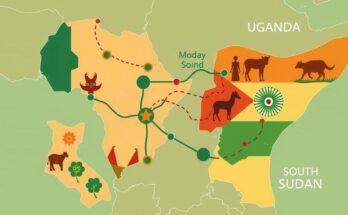Qatar’s Prime Minister Sheikh Mohammed bin Abdulrahman Al Thani has called for full implementation of the Gaza ceasefire agreement, anticipating a UN resolution to enforce it. The multi-phase deal, facilitated by Qatar, Egypt, and the US, aims to exchange captives and increase humanitarian aid while addressing Gulf relations with Syria. The article emphasizes the importance of international support and the rejection of Israeli incursions in the region.
In a recent exclusive interview with Al Jazeera, Sheikh Mohammed bin Abdulrahman Al Thani, Prime Minister of Qatar, underscored the necessity for the full implementation of the initial phase of the Gaza ceasefire agreement. He expressed hopes that the subsequent phase would conclude the conflict, anticipating a binding resolution from the United Nations Security Council to endorse the ceasefire.
The ceasefire deal, facilitated by Qatar, Egypt, and the United States, aims to halt hostilities between Hamas and Israel while establishing a framework for the exchange of captives. The agreement is set to take effect on Sunday, with the first phase lasting seven weeks, during which humanitarian aid will escalate and Israeli forces will gradually withdraw. The second phase is projected to initiate in March, assuming the first phase proceeds smoothly, contingent on Israeli approval.
Sheikh Mohammed praised the collaborative efforts of international mediators that led to the agreement, emphasizing Qatar’s neutral mediating role in the Gaza situation. He stated that the governance of Gaza post-conflict remains a matter reserved for the Palestinian people, not external actors. Furthermore, he advocated for sustained international support to aid families impacted by the conflict and established a protocol for aid delivery to prevent potential exploitation.
In addition to Gaza negotiations, Qatar is seeking to strengthen ties with the newly established Syrian administration led by Ahmed al-Sharaa. Sheikh Mohammed urged the lifting of sanctions imposed on Syria, arguing they were no longer justified following the regime change. He articulated the importance of easing these measures to allow the new administration to function effectively and address the needs of its citizens.
Moreover, Sheikh Mohammed condemned Israeli activities in the Golan Heights region, characterizing them as reckless incursions. He reiterated Qatar’s position on the necessity of an Israeli withdrawal from the demilitarized buffer zone, emphasizing that such actions should not alter the established realities within the region.
In conclusion, Sheikh Mohammed’s statements highlight Qatar’s diplomatic efforts to broker peace in Gaza and its commitment to supporting the new Syrian administration. Qatar’s role as a mediator is pivotal, and the call for sanctions relief underscores the changing dynamics within the region. His commitment to humanitarian aid and the call for international support reflect Qatar’s proactive approach in facilitating regional stability.
The current situation in Gaza remains tense following recent conflicts between Hamas and Israel. A ceasefire agreement has been negotiated to facilitate humanitarian aid and the exchange of captives, marking a significant effort to stabilize the region. International diplomacy is crucial, with key players like Qatar, Egypt, and the United States involved in mediating the peace process. Additionally, developments in Syria following the change of administration necessitate careful diplomatic engagement to ensure regional stability and humanitarian relief.
Sheikh Mohammed bin Abdulrahman Al Thani’s remarks signify Qatar’s strategic diplomatic role in the Middle East, focusing on the Gaza ceasefire and fostering relations with Syria’s new administration. His advocacy for international support and humanitarian protocols highlights a commitment to addressing the immediate needs of those affected by conflict. As Qatar continues to mediate effectively, the prospects for lasting peace depend on the successful execution of the ceasefire agreement and regional cooperation.
Original Source: www.aljazeera.com




